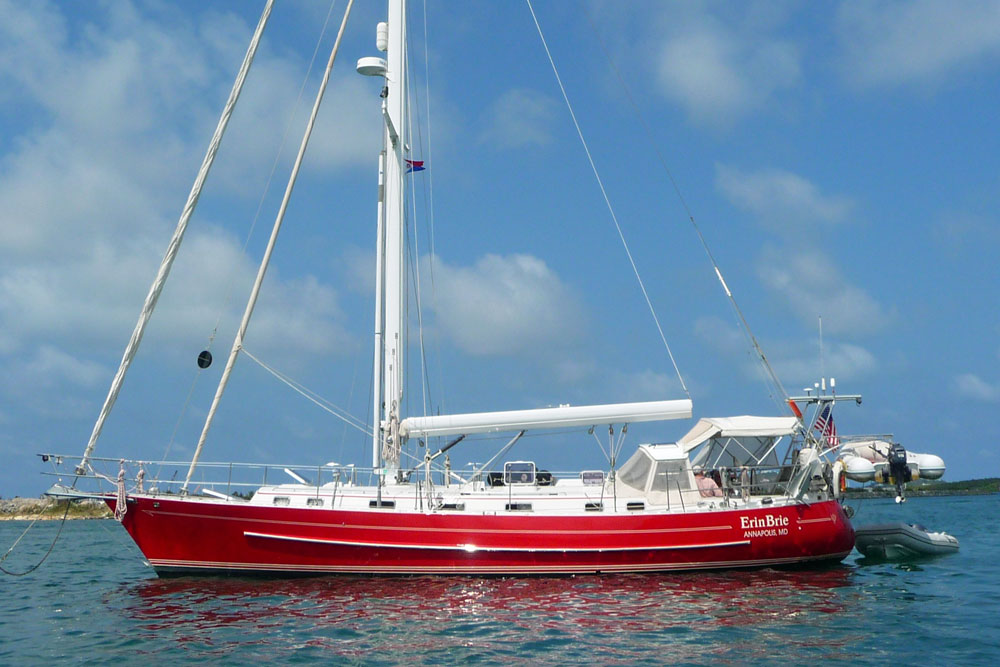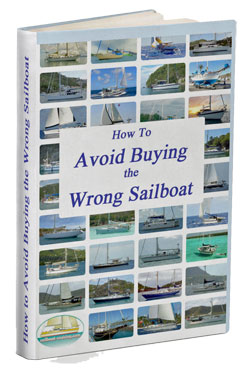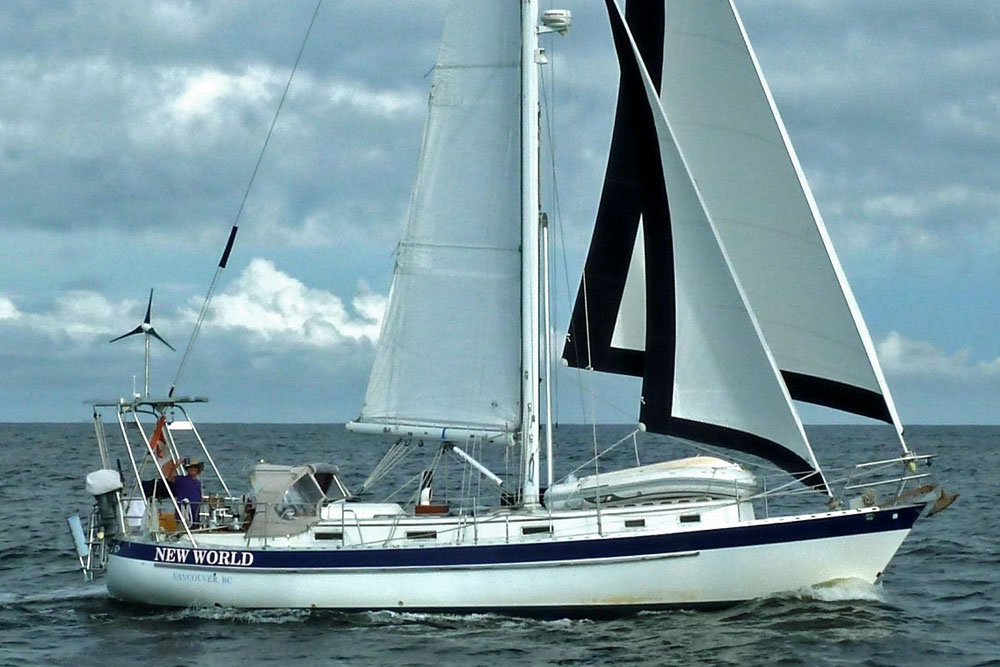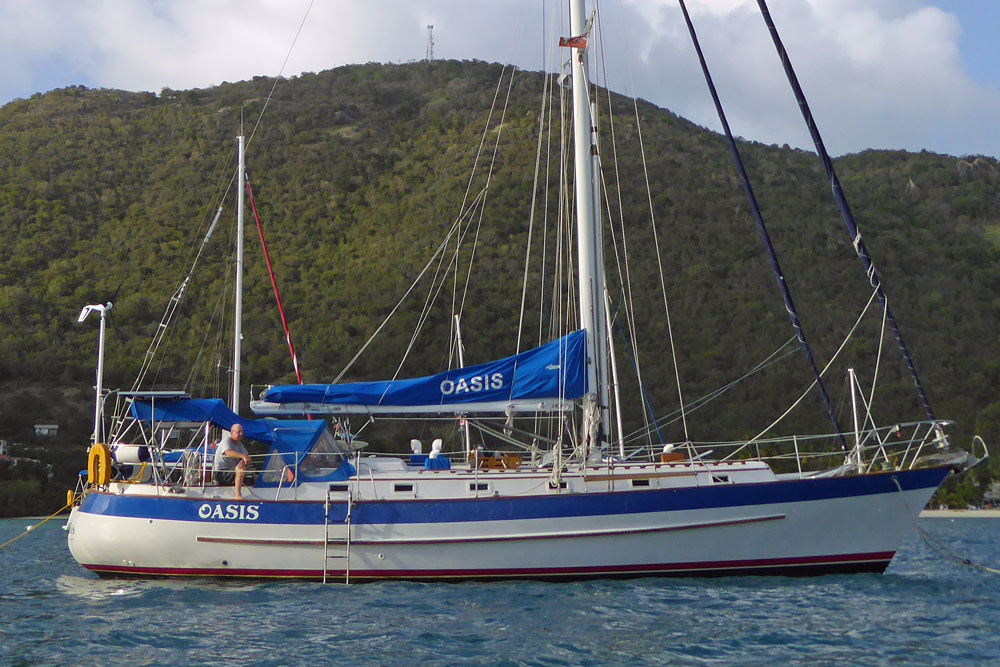- Home
- Sailboats 50'-55'
- Valiant 50
The Valiant 50 Sailboat
Specs & Key Performance Indicators
The Valiant 50 is a classic offshore cruising sailboat designed by Robert Perry and built by Valiant Yachts in Texas, USA. It is an evolution of the Valiant 47, which was launched in 1981 and became one of the most respected bluewater sailboats in the world. The addition of the bowsprit distinguishes the 50 from the Valiant 47.
Published Specification for the Valiant 50
Underwater Profile: Fin keel with skeg-hung rudder
Hull Material: GRP (Fibreglass)
Length Overall: 50'8" (15.4m)
Waterline Length: 40'3" (12.3m)
Beam: 13'10" (4.2m)
Draft: 6'3" (1.9m)
Rig Type: Cutter
Displacement: 35,550lb (16,125kg)
Designer: Robert Perry
Builder: Valiant Yachts (US)
Year First Built: 1994
Published Design Ratios for the Valiant 50
1. Sail Area/Displacement Ratio: 14.3
2. Ballast/Displacement Ratio: 30.9
3. Displacement/Length Ratio: 243
4. Comfort Ratio: 38.3
5. Capsize Screening Formula: 1.9
Summary Analysis of the Design Ratios for the Valiant 50
1. A Sail Area/Displacement Ratio of just 14.3 suggests that the Valiant 50 will need a stiff breeze to get her going. In light conditions, unless you've got plenty of time on your hands, motor-sailing may be the way to go.
2. A Ballast/Displacement Ratio of 30.9 means that the Valiant 50 is likely to benefit from being reefed early to keep her sailing upright in a moderate breeze.
3. A Displacement/Length Ratio of 243, tells us the Valiant 50 is a moderate displacement cruiser, which means she'll carry all your cruising gear without it having a dramatic effect on her performance. Most of today's sailboats intended for offshore cruising fall into this displacement category.
4. Ted Brewer's Comfort Ratio of 38.3 suggests that crew comfort of a Valiant 50 in a seaway is similar to what you would associate with the motion of a moderate bluewater cruising boat - a predictable and acceptable motion for most seasoned sailors.
5. The Capsize Screening Formula (CSF) of 1.9 tells us that a Valiant 50 would be a safer choice of sailboat for an ocean passage than one with a CSF of more than 2.0.
Any Questions?
Is the Valiant 50 still in production and, if not, when did production end and how many of these sailboats were built?
Is the Valiant 50 still in production and, if not, when did production end and how many of these sailboats were built?
The Valiant 50 is still in production as of 2023, although it is not a mass-produced boat. Each Valiant 50 is built by hand, one at a time, according to the owner's specifications. The first Valiant 50 was first delivered in 1994, and since then about 40 boats have been built.
How did the sailing press review the Valiant 50?
How did the sailing press review the Valiant 50?
The sailing press has generally given positive reviews to the Valiant 50, praising its quality, durability, comfort, safety, and performance. For example, Blue Water Sailing magazine called it "a proven passagemaker that can take you anywhere you want to go". Sail magazine described it as "a serious cruising boat for serious cruisers". And Yacht Database rated it as "a very good choice for long-distance cruising".
What is the history of the builders of the Valiant 50 and is the company still in business?
What is the history of the builders of the Valiant 50 and is the company still in business?
The builders of the Valiant 50 are Valiant Yachts, a company founded in 1973 by Nathan Rothman and George Hazzard. They contracted Uniflite, a powerboat manufacturer in Washington, to build their first design, the Valiant 40, which was designed by Robert Perry and became a success among performance cruisers.
In 1981, Perry designed the Valiant 47 for them, which was also built by Uniflite until 1983. In 1984, Rich Worstell, a former dealer for Valiant Yachts, bought the company and moved it to Texas. He continued to build the Valiant 47 until 1993, when he updated it to the Valiant 50 with Perry's help.
He also introduced the Valiant 42 in 1992, which was based on the original Valiant 40. Worstell retired in 2007 and sold the company to Rob Ezzell and Mike Burns, who are still running it today.
What keel options, if any, are available for the Valiant 50?
What keel options, if any, are available for the Valiant 50?
The standard keel for the Valiant 50 is a fin keel with a draft of 6 feet 3 inches. It is made of lead and weighs 11,000 pounds. It is attached to the hull with 18 stainless steel J-bolts and bedded with 3M 5200 sealant. The optional keel for the Valiant 50 is a shoal draft keel with a draft of 5 feet 6 inches. It is also made of lead and weighs the same as the standard keel. It has a slightly different shape to maintain the same righting moment and stability as the standard keel.
What is the Valiant 50 like to sail?
What is the Valiant 50 like to sail?
The Valiant 50 is a pleasure to sail in most conditions. It has a well-balanced helm, a smooth motion, and a good turn of speed. It can handle light winds as well as heavy weather with ease. It is also easy to sail shorthanded, thanks to its cutter rig, self-tailing winches, and autopilot. It tracks well on all points of sail and can tack through less than 90 degrees. It is responsive and maneuverable, but also stable and forgiving.
What is the average cost of a secondhand Valiant 50?
What is the average cost of a secondhand Valiant 50?
The average cost of a secondhand Valiant 50 depends on several factors, such as the year, condition, equipment, and location of the boat. According to YachtWorld.com, the current listings for used Valiant 50s range from $299,000 to $499,000 USD, with an average of $388,000 USD.
The above answers were drafted by sailboat-cruising.com using GPT-4 (OpenAI’s large-scale language-generation model) as a research assistant to develop source material; to the best of our knowledge, we believe them to be accurate.
Other sailboats in the Valiant range include:
Recent Articles
-
Gulfstar Hirsch 45 Review: Specs, Performance & Buyer's Guide
Mar 02, 26 03:44 PM
An expert review of the Gulfstar Hirsch 45 sailboat. We analyse performance ratios, construction quality, and what to look for when buying this classic blue-water cruiser. -
Jeanneau Voyage 12.50 Review: Blue-Water Performance & Buyer's Guide
Mar 01, 26 06:05 PM
A detailed review of the Jeanneau Voyage 12.50 sailboat. Discover technical specs, performance ratios, and a buyer's checklist for common problem areas. -
CSY 44 Sailboat: Comprehensive Review, Specs & Performance Analysis
Feb 22, 26 10:41 AM
An in-depth review of the CSY 44 sailboat. Discover technical specifications, design ratios, and why this heavy-displacement cruiser remains a top choice for ocean voyagers.



